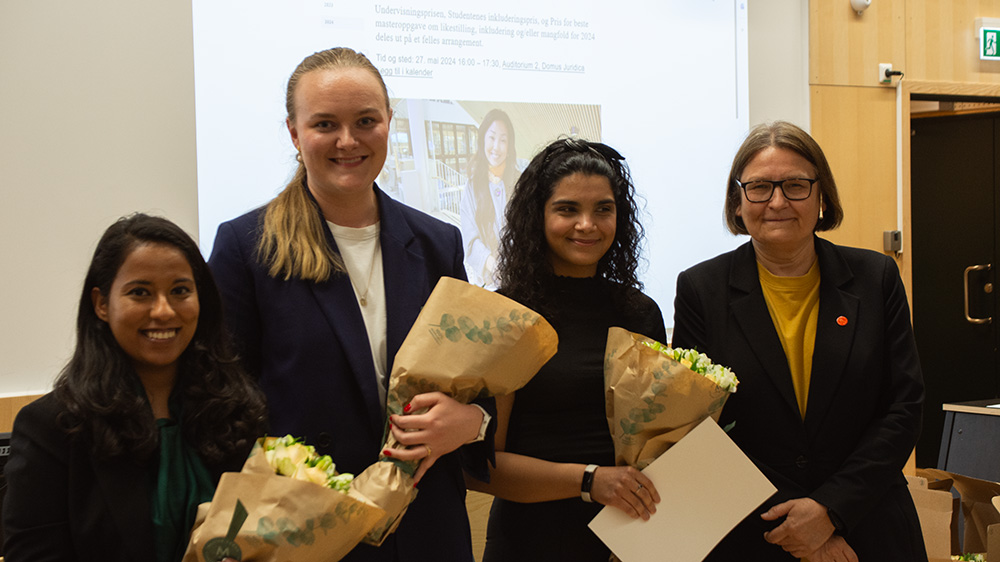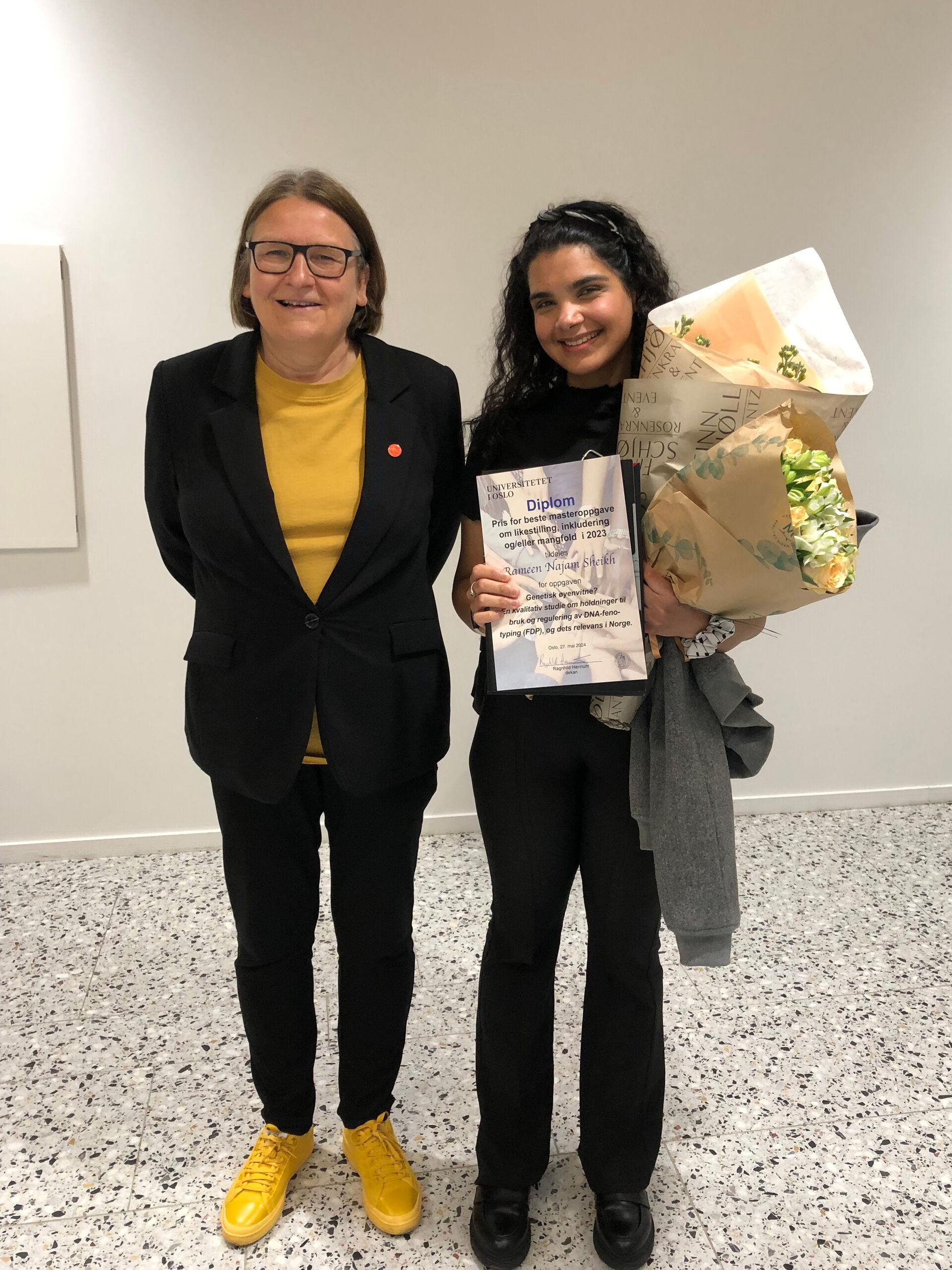About the prize
The prize is awarded annually to one master student at the Faculty of Law by the Faculty's Committee for Equality, Inclusion and Diversity (LIMU). To be nominated for the award, it is required that the master’s thesis concerns themes on equality, inclusion and/or diversity, such as gender, ethnicity, religion, life stance, pregnancy, disability or sexual orientation. The thesis must be 30 or 60 credits and with a grade of A or B. It is supervisors and examiners at the faculty who nominate for the award.
The nominees for 2023 were:
- Amanda Foss: «Voldsbegrepet i straffeloven § 282 og avtaleloven § 28: Sammenligning av voldsbegrepet og den avtalerettslige betydningen for ofre for økonomisk vold».
- Madeleine Holgeid: «Arbeidsgivers lønnskartleggingsplikt. En analyse av kriteriene «samme arbeid eller arbeid av lik verdi» ved sammenstilling av stillingsgrupper».
- Devika Santhosh Nair: «Defenders of the Earth: Examining Risks Faced by Environmental Human Rights Defenders in India and the Protection Mechanisms Accessible to Them».
- Rameen Najam Sheikh: «Genetisk øyevitne? En kvalitativ studie om holdninger til bruk og regulering av DNA-fenotyping (FDP), og dets relevans i Norge».
The Committee leader for LIMU and dean of the Faculty of Law, professor Ragnhild Hennum, presented this year’s jury members appointed by LIMU. The Committee consisted of professor emerita Inger Johanne Sand, Department of Public and International Law, professor emeritus Geir Ulfstein, Department of Public and International Law, and external jury member, May Schwartz, head of department in the Equality and Anti-Discrimination Ombud.
– The jury emphasizes that all four nominated master’s theses are well-written, interesting and address important, new issues. Everyone deserves praise for the effort put into their work, said Hennum.

An innovative and important thesis
After all the nominees had received flowers and praise from the dean, the dean announced Rameen Najam Sheikh as the winner of the Prize for the best master’s thesis on equality, inclusion and/or diversity:

– The jury rewards the thesis for addressing new issues related to the use of DNA technology and for the use of new methods. Sheikh discusses methodological issues related to the use of visualization, or «visual criminology», and the use of interviews to investigate attitudes. The thesis is thus original and innovative. The area the thesis deals with will become increasingly important as DNA and other genetic technologies become more frequently used, more effective and more relevant in many contexts.
– According to the jury, Sheikh’s thesis is clearly formulated even though the topic is new and quite technical. It is important that such new themes and issues are also addressed in student theses. Congratulations, said Ragnhild Hennum as she read out the jury's reasoning.
Grateful for the support she received from her supervisor
Sheikh said she was surprised to hear her own name being called:
– During the presentation of all the theses, I thought that this was a tough competition, because everyone seems so skilled. It is incredibly exciting to win, and I am so happy that I have had a supervisor like Mareile Kaufmann who saw the value of my work and who nominated it for the award. It was also very nice to hear the jury’s reasoning and that the thesis is seen as important by others as well!
Sheikh explained that she wanted to write about something new and explore a topic she had not previously written about in a bachelor’s thesis nor exams:
– Technology and algorithms were topics I hadn’t been particularly involved in before, neither academically nor in other contexts, and I saw it as something very complex and beyond my comprehension.
Sheikh further elaborated that it was only when she started reading up on the use of algorithms in police work that she became interested in the topic. Quickly she encountered Mareile Kaufmann, leader of the research project Digital DNA, and was sent several articles on DNA, genetics and technology:
– It was Mareile who planted the idea in me, and it was she who introduced me to the field of phenotyping. I was very lucky to be able to get Mareile as a supervisor. She gave me good guidance, professional inputs and the confidence that I could do this.
The relevance of the topic kept her engaged
As she got a deeper understanding of the topic of phenotyping, about how much information can be derived from DNA and everything it can be used for, Sheikh’s commitment to the ethical challenges associated with the field increased:
– I came to realize how pervasive technological optimism there is throughout society. This is also reflected in DNA technologies, despite several margins of error, in addition to the other challenges it brings. As one of my informants said: “Genetics sounds scientific, and scientific sounds like truth”. This is terrifying, said Sheikh.
That the thesis was so engaging and scary contributed to Sheikh’s motivation throughout the entire process of making the thesis:
– Even though I was rather tired of writing and only sitting in the reading room in the end, I amazingly never grew tired of the topic itself.
The dangers of using phenotyping and biometric data
Although Sheikh today is working with something completely different, she still tries to stay up to date on the topic of her thesis. She was not aware when she submitted her master’s thesis that the danger of discrimination, because of the categorization of people using phenotyping and biometric data, would be so relevant today:
– Earlier in May, Storebrand withdrew from the technology giant IBM because they operate and manage a biometric database in Israel that is used to discriminate and segregate Palestinians. Our time's greatest crisis is unfolding now, and advanced technology is extensively used in both warfare and the maintenance of the occupation against Palestinians, Sheikh said.
Sheikh thanked everyone for the warm applause during the award ceremony:
– Thank you very much for the nomination, firstly to my supervisor Mareile Kaufmann, who nominated it. I had no idea about this. It was very exciting to be nominated, and it's nice that the thesis is still remembered, even a year later. Also, thanks to my other supervisor, Maja Vestad, who is also here, said Sheikh.
– Lastly, I would like to say that I hope the University Board changes their mind and boycotts Israel. Free Palestine, and thank you for this, concluded Sheikh in her acceptance speech.
